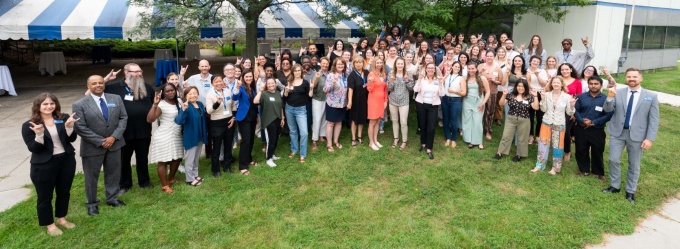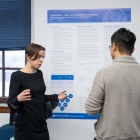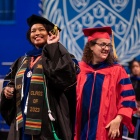Strengthening our Impact Through Community, Scholarship and Pedagogy
The UB School of Social Work's 2024-28 Strategic Plan

For every change agent, educator, researcher, practicum supervisor, innovator, staffer and student in the School of Social Work, our strategic plan is a call to action.
Today, social work is more important than ever. As our world undergoes profound sociocultural shifts, social workers must help humanity to navigate these challenges and move toward a trauma-informed, equitable future.
Join us as we build on the School of Social Work's legacy of excellence, scholarship and service and expand our profound impact on the diverse communities we serve.
Explore our strategic vision
As we continue to educate social workers who will lead the profession forward, this plan provides a blueprint for us to expand our reach through community engagement, scholarship and curricular innovation. By working together and maintaining a strengths-based outlook, we will build on our school’s stellar reputation and embolden our commitment to racial and social justice and trauma-informed care, all while deepening our impact locally and globally.”
— Keith A. Alford, Dean and Professor, UB School of Social Work

To build on our 90-year legacy, we embarked on a yearlong strategic planning process in 2023. We started by gathering insights to uncover trends in our enrollment, research, philanthropy and community dynamics.
To be as inclusive as possible, we spoke with stakeholders from across the school, including students, full- and part-time faculty, staff, alumni, practitioners and practicum educators, supervisors and liaisons. In addition, we held focused conversations with members of diverse communities, including our LGBTQ+ students and the UB Association of Black Social Workers.
For perspective, we also looked outward to benchmark our school against peer institutions and to examine societal trends and consider how our work could make a bigger difference in the communities we serve.
These exercises helped us to define the strengths that we will build upon over the next five years, including our trauma-informed and human rights focus; commitment to high ideals and passion for social work; impactful and varied research; collegiality across differing viewpoints; student support, flexibility and mentoring programs; innovative technology; and the depth and breadth of our academic programs.
In addition, we ensured that our vision aligns with UB’s strategic goals of achieving greater societal impact; providing students with transformative and research-grounded educational experiences; promoting a culture of equity and inclusion; and deepening our community engagement.
In the end, five strategic areas of focus, or pillars, emerged that capture our highest aspirations and will guide our work over the next five years. At the core of this plan — and our school's mission — is a commitment to elevating trauma-informed care and human rights and to promoting diversity, equity, inclusion and accessibility in a society where such assurance is needed more than ever.
Our mission is to prepare compassionate, culturally competent and socially conscious social workers who will be advocates for change, champions for justice and catalysts for healing in a diverse and interconnected world.
While doing so, we maintain an unwavering commitment to trauma-informed and human rights perspectives and the principles of diversity, equity, inclusion and accessibility and racial equity. These principles are critical to everything we do as a school and serve as the foundation for this strategic plan. Therefore, before proceeding, we wish to establish a shared understanding of what these terms mean within our community:
Trauma-informed care provides a framework for individuals and organizations — including the School of Social Work — to engage in universal precautions and avoid inadvertently retraumatizing vulnerable people through the principles of safety, trustworthiness, choice, collaboration and empowerment. In our curriculum and practice, our approach is trauma-informed, emphasizing empathy, sensitivity and resilience-building.
Human rights are those rights inherent to all humankind, including the right to life and liberty, freedom of expression, freedom from slavery, and more. We believe education is a human right and are dedicated to making our programs accessible to all by striving to remove financial, physical and systemic barriers to ensure everyone has the opportunity to learn and grow.
Diversity refers to the ways people differ, including their age, race, ethnicity, gender identity and expression, sexual orientation, ability and other characteristics. Diversity also considers an individual’s education, income, faith, work and life experience and histories, geographic location and family status.
Equity is about ensuring that all individuals, regardless of their background, have equal access to resources and opportunities to succeed. Equity focuses on addressing and dismantling systemic discrimination. Maintaining continuous awareness of the need to make systems, behaviors, practices, human conditions and social circumstances more equitable is paramount.
Inclusion is when all members of a group — especially those from historically marginalized backgrounds — feel safe, empowered and valued. At the School of Social Work, our commitment to fostering a sense of belonging is rooted in the university’s values of diversity, inclusion and mutual respect.
Accessibility is the degree to which a facility, product or service can be used by as many people as possible, including individuals with disabilities of any kind, whether visible or not. According to the U.S. Department of Education, accessible means “a person with a disability is afforded the opportunity to acquire the same information, engage in the same interactions and enjoy the same services as a person without a disability in an equally effective and equally integrated manner, with substantially equivalent ease of use.”
Racial trauma results from real or perceived experiences of racial discrimination, including threats, prejudices, harm or shame either experienced or witnessed. It is characterized by the temporality, intensity and frequency of the trauma.
Racial equity allows us to move toward a future of racial justice, transforming our society by eliminating systemic barriers so people of color have the dignity, resources, power and self-determination to thrive. At a macro level, racial equity is achieved when racial identity no longer predicts the opportunities an individual or group receives or the outcomes they may enjoy. To reach racial equity, we must acknowledge historical injustices, including slavery, colonization and discrimination. Moreover, we must seek to amplify the voices of marginalized communities and ensure their participation in decision-making processes.

Research and Scholarship
Accelerate social work research and scholarly eminence for a trauma-informed, equitable future. The School of Social Work recognizes that research and scholarship are processes that use multiple methods to build knowledge within and across content areas that reflect the school’s mission to promote trauma-informed approaches integrated with social and racial justice to enhance the well-being of individuals, families and communities.
- Increase School of Social Work research expenditures.
- Cultivate a dynamic research culture that inspires enhanced scholarship and dissemination of research findings and their impact.
- Create a community-based research hub within the Buffalo Center for Social Research.

Dynamic Learning Environment
Create a dynamic learning environment that prepares leaders, practitioners and scholars to solve diverse 21st century challenges through culturally responsive, trauma-informed, antiracist and equity-based curriculum and practicum experiences that are consistent with a fast-changing and turbulent social environment.
- Integrate racial trauma into all School of Social Work programs to reflect our curricular priorities related to trauma-informed and human rights perspectives and DEIA.
- Empower all instructors, including practicum instructors, with the skills and resources necessary to provide equitable, culturally responsive and engaging educational experiences for all students.
- Be responsive to contemporary issues, including those related to DEIA, in both how we craft course content and how we regularly create strategic initiatives that elevate important issues for our school community.
- Enrich the curriculum by facilitating regular opportunities for dialogue and exchange between faculty and community members in practicum education and practice, generating knowledge about trends in practice and exposing students to roles and practice areas beyond those in their practicum.

Recruitment and Retention
Increase the diversity and success of our full- and part-time faculty and staff, administration and students to reflect the City of Buffalo and other communities we serve. In the pursuit of this objective, we define diversity broadly and inclusively and place special emphasis on increasing the racial and ethnic diversity of our workforce and student body.
- Build and retain a diverse workforce that better reflects the communities we serve.
- Build and retain a diverse student body that better reflects the communities we serve.

Culture, Belonging, Inclusion and Accessibility
Foster a culture of community, belonging, inclusion and accessibility that empowers every member of our community to achieve their full potential, values their uniqueness and defines our ability to deliver our teaching, learning, research and service mission.
- Advance the school’s DEIA infrastructure, policies and professional development to spark a culture of belonging, inclusion and accessibility.
- Foster a sense of belonging among all students, acknowledging the unique challenges of building community in both exclusively online and seated academic programs.
- Promote a culture of trust, respect and shared responsibility among all staff and faculty.
- Create a physical, teaching and learning environment that is accessible, welcoming, equitable and encouraging of community-building and belonging.

Community Engagement
Deepen our engagement with communities to foster mutually beneficial relationships.
- Create a community-based research hub within the Buffalo Center for Social Research to provide support for community-engaged research and scholarship.
- Support community-engaged teaching in the School of Social Work.
- Elevate community voices and develop collaborative partnerships to co-create knowledge, highlight practice innovations and advance policy.
